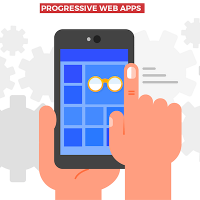10+ Frameworks and Tools to Consider for PWA Development
From AliExpress to Forbes, Starbucks, Instagram, George, Trivago, Uber, and Medium, a vast number of top brands have switched to the PWA environment and recorded a significant rise in their ROI. Especially, in terms of faster app loading & higher customer engagement and retention rate.
These brands have not just unveiled the numbers publicly, but have also encouraged others to step into the PWA development world. A consequence of this is that even developers these days are discussing the comparison of PWAs and Native apps to see which line brings better future opportunities.

Amidst of this, if you are someone who has witnessed the difference and has decided to enter the PWA world, but is clueless which development frameworks and tools can help in the same, this article is going to be a good read for you.
However, it is wise to take a quick look at the basics of Progressive Web applications (PWAs) first.
So, let’s look into the same first.
A Brief Introduction to Progressive Web Applications
In simpler terms, Progressive Web Applications (PWAs) are a perfect blend of web apps and native applications. These are web applications that use a vast number of standard patterns and latest technologies to function across platforms, load faster, and deliver an app-like experience to users. And that too, without directing them towards app stores and go through the hectic process of downloading and installing the application.
PWAs, as already noticed by various business owners and app developers, have the potential to revolutionize the user experience in different ways. Some of which are as follows –
- It combines the UX of a native mobile app with the advantages of web applications.
- It reduces the app development cost by 75%.
- The Progressive Web App loading time is 2-3x less than that of a normal native application, which increases the chances of attracting the targeted user base.
- These applications lower down the server load, that reduces the risk of slowdown or crashing of the store/services during periods of sky-high traffic.
With this attended to, let’s dive deeper into the PWA development environment and see what are the best frameworks and tools to consider.
11 PWA Development Frameworks and Tools
1. Ionic
Ionic is the foremost framework to employ for PWA development. It comes loaded with a myriad of features and functionalities, such as –
- It is free and open-source in nature. Meaning, developers can manage the code structures easily and effortlessly, along with relishing the opportunity to connect other Ionic developers within the community.
- It has a codebase feature that lets you make seamless applications for Android, iOS, and other platforms.
- It is loaded with pre-built components that enable you to create customized design themes and elements. This way, develop a highly-robust, interactive, faster, and native-like application.
- It also facilitates a powerful CLI for developing, testing, and deploying cross-platform applications efficiently.
2. Angular
Angular, one of the top JavaScript frameworks, can also be taken into consideration for entering the PWA world.
The framework, before the release of version 5, demanded a lot of expertise in the development environment. However, since the Angular 5 version was released back in November 2017, it has come equipped with built-in PWA support, service worker updates, and new CLI commands. This has made it easier to make web applications downloadable and installable, making it appear just like a native mobile app.
3. React
Powered by Facebook, React also lands into the most preferred PWA development frameworks and tools list. It has a ubiquitous ecosystem and empowers app developers to easily build a react-app generator that automates data for PWA development, reuse and share code lines, and customize the development environment as per the business requirements.
What’s more, it avails the functionality of Virtual-DOM that speeds up the development process, and encourages web app builders to build flexible and scalable applications.
4. Vue.js
Vue.js, the framework called as the child of Angular and React, is also widely chosen by progressive web app developers like Appinventiv, because of the benefits it offers. This includes –
- Though new in the development world, it comes with highly descriptive documentation which enables developers to easily get hands-on this framework.
- It avails high-speed rendering along with virtual DOM.
- The framework comes loaded with in-built support to upgrade an application and restrain unnecessary components, along with the facility to use a web-pack template that further helps web developers to avoid coding for a major fraction of the application.
- Additionally, it facilitates working with varied environments, including that of PHP and JavaScript.
5. Svelte
When talking about developing a Progressive Web Application (PWA), using Svelte is also one of the best decisions.
Developed in 2018, this JS framework enables one to load a single bundle.js onto a page to render the application. In other words, it lets developers write components using HTML, CSS, and JavaScript and compile them into small and standalone JS modules. This way, it ensures simpler coding and faster processing of web applications.
Also, it is beginner-friendly, has a clear syntax structure, and provides higher performance, which becomes a selling point for both app developers and business owners.
6. Lighthouse
Lighthouse is again one of the best progressive application frameworks and tools designed by Google.
This open-source and automated tool facilitates builders with better ways to develop PWAs and audit them for performance, accessibility, and other factors. Also, it runs in Chrome DevTools, from the command line, and a Node module, which makes it easier for one to continue their development process from any of these environments efficiently and effectively.
7. Polymer
The Polymer is yet another JavaScript framework that you can use for building a PWA. This Google-backed framework is lightweight and enables developers to create reusable elements that help in better data synchronization with devices. Also, the frameworks come up with a Polymer App Toolbox that empowers them to create a responsive design and simplify the development process.
However, there’s a limitation.
The usage of this framework increases the app size and also, the load time. So, it is advisable to prefer this PWA development framework only when you are planning to build a small-size application.
8. Webpack
Webpack is a highly useful tool for bundling JavaScript application resources, constituting non-code assets such as fonts and images. These can be served as JavaScript objects, which can further empower them to load faster.
The platform is also beginner-friendly, has a steep learning curve, and provides the functionality to easily manage dependencies, along with wider documentation.
9. Knockout
Another tool to consider for building your own Progressive web application is Knockout.
This free and open-source tool aids in MVVM (Model-View-ViewModel) bindings and empowers you to simplify the process of working with JavaScript UIs by providing the opportunity to define views and declarative bindings that are managed by ViewModel properties.
Also, the platform runs purely on JavaScript on which all the main browsers and web frameworks work. This clearly indicates that you can easily integrate the Knockout library with the pre-existing websites without rewriting extensive codes.
10. PWA Builder
When it comes to developing a Progressive web application, PWA Builder is second to none.
This platform provides a myriad of options such as offline functionality, launching PWA on Apple App Store and Play Store, and ease of customization of properties such as the app language, background color, and screen orientation.
11. Workbox
Last but not least, Workbox is a set of libraries and Node modules that provides the ease to cache assets and reap benefits of features required for PWA development.
It is a flexible well-defined PWA library that encapsulates the boilerplate code with methods that enables developers to implement service worker functionality. It is also production-ready with features such as caching strategies, request routing, runtime caching, and precaching, which makes it possible for developers to build faster and reliable web applications.
Now, as you have a complete list of PWA development frameworks and tools, do not take a back seat. Bring your team on-board, discuss the idea, and look ahead to developing your own Progressive web application.
About the Author

Bhupinder Kour – holding a Bachelor’s degree in Technology and 3 years of work experience in a mobile app development company. Bhupinder is focused on making technology digestible to all. Being someone who stays updated with the latest tech trends, she’s always armed to write and spread the knowledge. When not found writing, you will find her answering on Quora while sipping coffee.

















